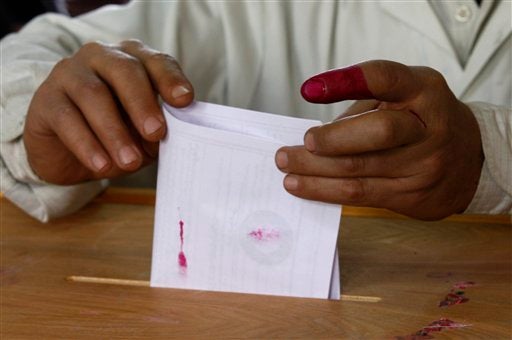|
January 30, 2014
Stanford scholars examine evolution of democracy in South Korea, Taiwan
In a new book, Stanford experts analyze the challenges and opportunities confronting South Korea and Taiwan's maturing democracies. Much depends on the political leadership in those two countries rising above narrow interests to craft thoughtful and realistic public policies. By Clifton B. Parker

In a new book, Stanford experts analyze the challenges facing maturing democracies in South Korea and Taiwan. Here, demonstrators protest against Taiwan President Ma Ying-jeou in Taipei in September 2013. (Photo: AP / Chiang Ying-ying)
South Korea and Taiwan are political proof that liberal democracies can thrive in the Confucian cultures of Asian countries, according to Stanford scholars.
But the maturing democracies there face risks, and much depends on the political leadership in those countries.
"It will fall to the elected political leaders of these two countries to rise above narrow and immediate party interests to mobilize consensus and craft policies that will guide the structural adaptation and reinvigoration of the society and economy," said Gi-Wook Shin, the director of the Walter H. Shorenstein Asia-Pacific Research Center.
Shin is a co-editor of the new book, New Challenges for Maturing Democracies in Korea and Taiwan, along with Larry Diamond, a senior fellow at the Hoover Institution and the director of the Center on Democracy, Development and the Rule of Law at the Freeman Spogli Institute for International Studies.
Diamond noted, "In distinctive but also somewhat similar respects, both Korea and Taiwan must find ways to renovate their democratic institutions in order to find durable policy solutions."
He said that part of the purpose of the book is to probe and capture a paradox.
"Of the dozens of new democracies that have emerged in recent decades, those in Korea and Taiwan are among the most successful and most likely to endure," Diamond said. "Yet citizens in each country are restless and unhappy with their parties and politicians."
Now that Korea and Taiwan have joined the ranks of advanced industrial countries, they also face many of the social and economic challenges of mature democracies worldwide – aging populations, widening income gaps and low levels of political confidence, he said.
Confucian cultures
Comparing these two Confucian cultures with those in the long-democratic West, Shin and Diamond puncture the point of view that liberal democracy is not suitable for Confucian Asian countries.
Confucianism focuses on the practical, especially the importance of the family and authority. It is an ethical and philosophical system developed from the teachings of the ancient Chinese philosopher Confucious.
In today's world, Shin and Diamond note, the risks to democracy are always great, and it's hard to attain and sustain democracy and thrive in a harsh world of global geopolitics.
For example, what political impact do regional threats from North Korea and China have on those countries? Both South Korea and Taiwan endure constant peril and threats from their authoritarian neighbors.
Korea is a divided country, and issues regarding North Korea have become controversial issues in South Korean politics, Shin said.
In Taiwan, the pro-independence versus pro-unification split also plays an important role in defining the political spectrum, he said.
"In both countries, the presence of threats from North Korea and China has a significant impact on the political cleavages of each country," Shin said.
He said that social movements in both countries influence their political directions – a not uncommon occurrence in growing democracies where voices are louder rather than quiet, and people are increasingly engaged rather than passive.
"In the case of South Korea, where direct elections were first held in 1948, social movements were extremely important and useful in the process of post-democratization. Nongovernmental organizations and social sectors played a critical and enormous role during the democratization process, functioning almost as a political party," said Shin.
He said that a series of public protests in the summer of 1987 provided crucial "bottom-up pressure" that contributed to the ruling bloc's decision to institute political reform. "However, the grand scale of protests that summer was possible only because South Korea's social movement sector was already well developed by that time."
For more Stanford experts in political science and other topics, visit Stanford Experts.
-30-
|